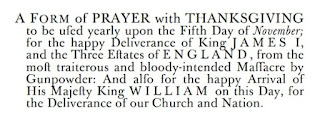A day to give thanks for the Jacobean Church
... that they may never prevail against us, or triumph in the ruin of thy church among us - from 'A Form of Prayer with Thanksgiving to be used yearly upon the fifth day of November'.
If the Gunpowder plotters had been successful, it would have been the ruin of "thy church among us". As Guy Fawkes and his fellow conspirators gathered, James had been on the throne of England for just over two years. Already, however, as Supreme Governor of the ecclesia Anglicana, he had convened the Hampton Court conference and rejected Puritan demands for substantial revision of the Book of Common Prayer. His 1604 Proclamation explicitly declared this rejection:
we found mighty and vehement informations supported with so weak and slender proofs, as it appeared unto us and our council, that there was no cause why any change should have been at all in that which was most impugned, the Book of Common Prayer, containing the form of the public service of God here established, neither in the doctrine which appeared to be sincere, nor in the forms and rites which were justified out of the practice of the primitive Church.
The Proclamation went on to state that no further revision of the Prayer Book would be considered:
we do admonish all men that hereafter they shall not expect nor attempt any further alteration in the common and public form of God's service, from this which is now established, for that neither will we give way to any to presume, that our own judgment having determined in a matter of this weight shall be swayed to alteration by the frivolous suggestion of any light spirit.
Likewise, James had authorised the 1604 Canons, addressing a gap in the Elizabethan Settlement. The Canons defined the pillars which - after the deluge of the 1640s and 50s - would be the basis of the Restoration settlement of the Church: the Royal Supremacy, the Book of Common Prayer, the Articles of Religion, the Ordinal. Alongside this, they also secured the decent rites and ceremonies of the Church of England: the wearing of the surplice, kneeling to receive the Sacrament, the sign of the Cross in Baptism.
The Hampton Court conference also led to the Authorized Version of the Scriptures, itself a reflection of Jacobean Anglicanism. In the words of 'The Translators to the Reader':
we have on the one side avoided the scrupulosity of the Puritans, who leave the old ecclesiastical words ... as also on the other side, we have shunned the obscurity of the Papists.
Later in his reign, in 1617, James would issue the Book of Sports, a defence of a populist Anglicanism festivity against "Puritans and Precisians". It evoked a wider sense of a Church embedded in parish, place, and culture, characteristics which would define Anglicanism over and against Puritan sectarianism.
Finally, James' 1622 Directions concerning Preachers set a course for Anglicanism which would come to fruition at the Restoration, with 'moderate and modest' preaching, as Jeremy Taylor later called for: "Let the business of your Sermons be to preach holy Life, Obedience, Peace, Love among neighbours, hearty love". James' Directions exhorted parish clergy to "confine themselves wholly to those two heads of faith and good life, which are all the subject of the ancient sermons and homilies", prohibiting them from engaging in theological controversies which unsettled the Church's peace:
do from henceforth presume to preach in any popular auditory the deep points of predestination, election, reprobation or of the universality, efficacity, resistibility or irresistibility of God's grace; but leave those themes to be handled by learned men, and that moderately and modestly by way of use and application, rather than by way of positive doctrine, as being fitter for the schools and universities, than for simple auditories.
Against this background, it is not then surprising to consider how Jacobean Anglicanism nurtured influential Conformists and Laudians. Matthew Wren received orders in 1611; Donne in 1615; Bramhall 1616; Cosin 1621; Herbert 1626; Ferrar 1626; Taylor 1633. Here was the flourishing of Jacobean Anglicanism, those who would embody its vision and ethos, a vision and ethos which would define 1662 Anglicanism. As Charles Prior notes in his Defining the Jacobean Church (2005), Laudianism (or 'Carolinism') was "deeply entrenched in Jacobean religious culture".
On 5th November, we recall how it could have been so very different. We recall how this rich flourishing of the ecclesia Anglicana could have been lost, if the Gunpowder plotters had been successful. Jacobean Anglicanism would have been undone at its outset. Instead we offer thanksgiving that their plot failed, that "the ruin of thy church among us" did not come to pass. And we rejoice that the rich fruit of the Jacobean Church continues to sustain and nourish the Anglican tradition.




Comments
Post a Comment